Nursing Students Learn About Community Nursing
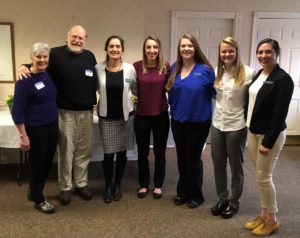
Laurie Harding and Bob Rufsvold (left), Co-Directors of the UVCNP, with Professor Shari Goldberg and Colby-Sawyer College Senior Nursing Students in April 2018.
Recently, a group of four Colby-Sawyer College Nursing students completed a Nursing Leadership Capstone Project with the Upper Valley Community Nursing Project.
Upper Valley Community Nursing Project
The Upper Valley Community Nursing Project helps elders receive continuity of care and remain independent—at home and in their community. The Project Co-Directors provides advocacy, training, and technical assistance to communities throughout our region who want to add a health professional to the informal network of volunteers already providing care for elders. They also facilitate the placement of a nurse in a community to address non-acute needs of elders at home. The Project is led by Laurie Harding, MS, RN, and Bob Rufsvold, MD. Ms. Harding founded the Project with Dr. Dennis McCullough using a holistic philosophy of nursing, which dates back to the mid-19th century.
As of April 2017, the Upper Valley Community Nursing Project (UVCNP) provides support and consultation to community and parish nurses in New Hampshire and Vermont towns. These towns include Grantham, Hanover, Lebanon, Lyme, Hartford, Sharon, and Thetford. Laurie and Bob are also available to work with communities who wish to add a community or parish nurse. They assist with understanding the role of the nurse, developing job descriptions, and may provide some initial funding to help the community launch a community nursing program.
Over the past year, the UVCNP has worked closely with staff at Dartmouth Hitchcock Community Health to build a database for the project. The tool will allow community and parish nurses to capture information about the people they see. Data from this tool can be used to provide important information about the value of these programs and opportunities for quality improvement.
Student Nurses Learn About Community Nursing
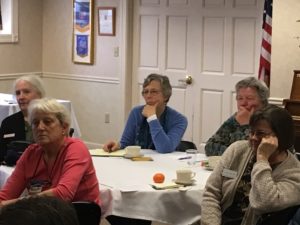 On April 10, 2018, students from the Colby-Sawyer College Department of Nursing presented the results of their Nursing Leadership Capstone Project to the Co-Directors of the UVCNP, and a number of community and parish nurses and community volunteers. According to Associate Professor Shari Goldberg, PhD, RN, “The year-long Nursing Leadership Capstone experience, as well as our community and public health nursing course, complement the exquisite acute care clinical experiences at Dartmouth-Hitchcock Medical Center that students complete throughout our nursing program. During their capstone experience, students examine health care at the organizational, community, and public policy levels of care, and develop a growing understanding of the social determinants of health. Many of the capstone students work with agencies that serve the needs of older adults, preparing them to care for an aging population.”
On April 10, 2018, students from the Colby-Sawyer College Department of Nursing presented the results of their Nursing Leadership Capstone Project to the Co-Directors of the UVCNP, and a number of community and parish nurses and community volunteers. According to Associate Professor Shari Goldberg, PhD, RN, “The year-long Nursing Leadership Capstone experience, as well as our community and public health nursing course, complement the exquisite acute care clinical experiences at Dartmouth-Hitchcock Medical Center that students complete throughout our nursing program. During their capstone experience, students examine health care at the organizational, community, and public policy levels of care, and develop a growing understanding of the social determinants of health. Many of the capstone students work with agencies that serve the needs of older adults, preparing them to care for an aging population.”
This group of four senior nursing students they shadowed community nurses in a number of communities. They also conducted a review of the information collected to date. According to one student, Courtney Lambert, “Working with the UVCNP has been an eye-opening experience. I feel fortunate to have been able to spend time learning about the role of the community nurse and seeing how important they are to their communities.”
Who Community Nurses Serve
The students, Emily 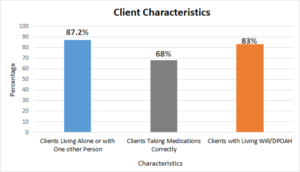 Crow, Courtney Lampert, Emily Martin, and Ashma Shrestha, shared summary characteristics about the people served by community and parish nurses in five communities. They were able to examine trends across nearly 200 clients with records in the UVCNP’s database. In general, they found the people served were over the age of 75 and lived alone. Most clients had multiple health and safety risks. Helping clients learn to take their medications properly was a common role for community nurses. Nurses often provided reassurance to clients or family members in cases of emergency or after returning from hospital stays. They often guided people looking for resources to help with daily tasks. Nurses also screened clients for falls and other safety risks and provided education and referrals.
Crow, Courtney Lampert, Emily Martin, and Ashma Shrestha, shared summary characteristics about the people served by community and parish nurses in five communities. They were able to examine trends across nearly 200 clients with records in the UVCNP’s database. In general, they found the people served were over the age of 75 and lived alone. Most clients had multiple health and safety risks. Helping clients learn to take their medications properly was a common role for community nurses. Nurses often provided reassurance to clients or family members in cases of emergency or after returning from hospital stays. They often guided people looking for resources to help with daily tasks. Nurses also screened clients for falls and other safety risks and provided education and referrals.
The data so far, though limited, suggests these nurses often succeed in resolving or helping clients manage health concerns effectively. Most notably, of the 36 people who had been discharged by a community nurse, none reported they no longer wanted the services. Reasons for discharge included moving away, no longer requiring services, or death. The students final Capstone Presentation provides an overview of how they planned their project, what they did, and what they learned about community nursing and the participants who call upon them for support.
An Eye-Opening Experience
All the Colby-Sawyer students expressed real gratitude for the chance to learn about community nursing. The Capstone Project was their first experience in nursing outside the walls of an institution. Emily Crow shared how deeply the project has affected her: “I don’t think I truly understood the significance of community and parish nurses until I was able to see their impact through home visits and this data analysis project. Community-dwelling older adults are such a large portion of the Upper Valley’s population and the nurses working with them in their communities are truly heroes. I will carry the lessons I have learned through working with the UVCNP into my future nursing career. We didn’t choose this project. It chose us and we are so glad that it did.”
I feel lucky to be a part of this project. This project has helped me expand my knowledge about the role and the importance of community/parish nurses in improving health outcomes of older adults aging in community. — Ashma Shrestha
These Nursing students will all graduate from Colby Sawyer College in May. They have all accepted jobs at Dartmouth Hitchcock Medical Center. Based on the quality of their Capstone Project work and their genuine respect for the community and parish nurses they met, we are very lucky they have chosen to stay in our community. Emily Crow will be working in the Birthing Pavilion. Ashma Shrestha and Emily Martin plan to work on a medical specialties unit. Courtney Lampert will join the Intermediate Special Care Unit. We wish them all the best!
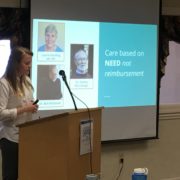


Leave a Reply
Want to join the discussion?Feel free to contribute!